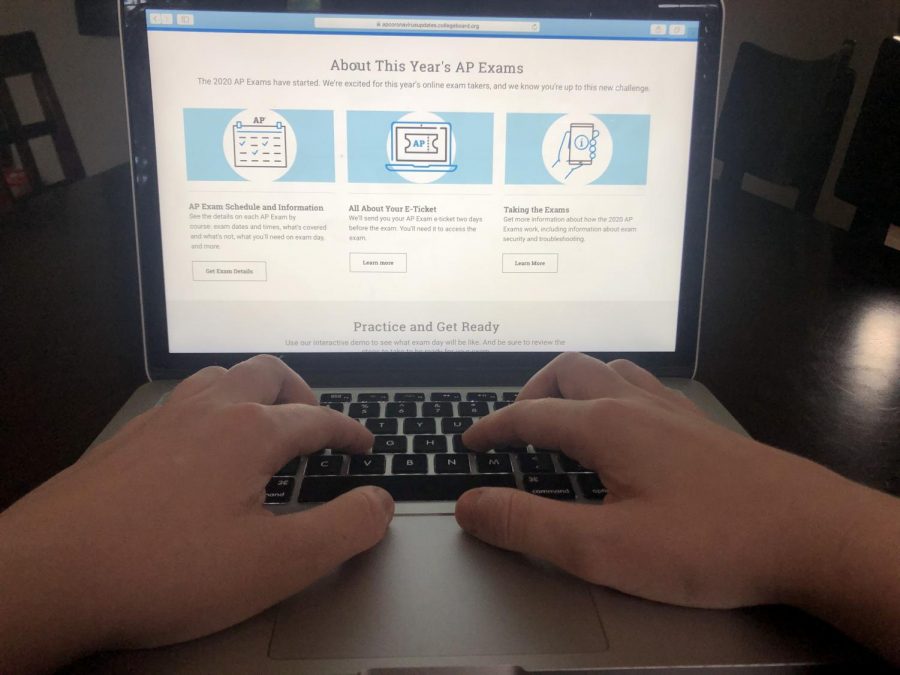Advanced Placement tests adapt to virtual exams
AP exams will be electronically administered May 11-22, and students will have 45 minutes to complete each test. Each course will have makeup test dates available June 1-5.
Due to the unforeseen impact of Covid-19, the College Board adjusted its testing policies for this year. All tests will be available online through any device, and students will only be tested on what a typical class would have learned by early March. Students can also reference any notes or textbooks while completing the exam, though they may not enlist the help of others.
“[Students] signed up to try to earn college credit, and [the College Board] is still giving them the opportunity to do so on a more-than-fair, limited basis,” AP English Language and Composition teacher Blake Bogus said. “A lot of students get anxiety or panic at the fact that the [standard] test is three hours and 15 minutes long, but in this case, it’s 45 minutes and you’re done. The only problem would probably be some technological issue with uploading it in time or getting your timing right. But, I’ve encouraged all [students] to get on board, because I think it’s a great opportunity to get the credit.”
The College Board surveyed 18,000 students to find out if they still wanted the chance to complete the exam, and the answer was a “resounding” yes. To prepare students and teachers, the organization released several specialized videos for each class to allow students the opportunity to practice independently.
“I’m excited and pleasantly surprised that they were still able to make it work and still offer the test to us, even though we can’t go somewhere and take it,” AP Language and Composition student Kylee Hendrickson said. “I feel like it’s going to be a little bit easier because it’s going to be shorter and we’ll be in the comfort of our own home, though I feel like I might have a little trouble focusing. Overall, I feel good about it, especially since the College Board came out with their YouTube videos and the articles that explain everything.”
While some students are grateful for the opportunity to take the test under strenuous circumstances, others are concerned about the new format of the exam. The format allows students to type and upload their responses or write them on paper and submit a photo within the last five minutes of the given time.
“It’s kind of intimidating, and I also don’t know if it’s worth it because we don’t have a teacher or a classroom, so we’re studying on our own, and it’s hard to stay motivated,” AP chemistry and calculus student Claire Song said. “Also, I think the formatting is just really weird; I’ve been doing practices for chemistry with the demo online, and it’s just weird having to write it out and take pictures, and if you don’t submit it in time, you won’t get any credit at all.”
Because the structure of the test is online and open-note, some students are worried about the possibilities of cheating. To ensure academic integrity, the College Board has announced that they will be utilizing anti-plagiarism software, administering the courses’ test at the same time and on the same day for all students, as well as monitoring social media outlets for content that might implicate individuals.
“It’s a 45-minute test that’s open-note at home, and there’s so much ability to cheat that I feel like colleges wouldn’t take credit for it,” Song said. “They might acknowledge that you took it and got a good score, but they could make us test out of the class once we get there, or take the class again.”
Teachers are encouraging students to take advantage of the restructured test because of the abundance of resources being given. The College Board has made efforts to supply students and teachers with ample information through social media, e-mail and their website.
“They are out in front of it, they made this decision weeks ago, theoretically we had six weeks notice, so I think that’s pretty good,” Bogus said.” All of the materials they are covering have been taught already. They limited the material to what students are supposed to have been taught by the time we all stopped. They will probably go back and say ‘Oh, maybe we could have done this differently,’ but on our end, they are communicating almost daily. This format might actually be less constrictive for students.”

Senior Katlynn Fox is the Editor-In-Chief and this is her second year on staff. In her free time she enjoys listening to music, watching rom-coms and hanging...



